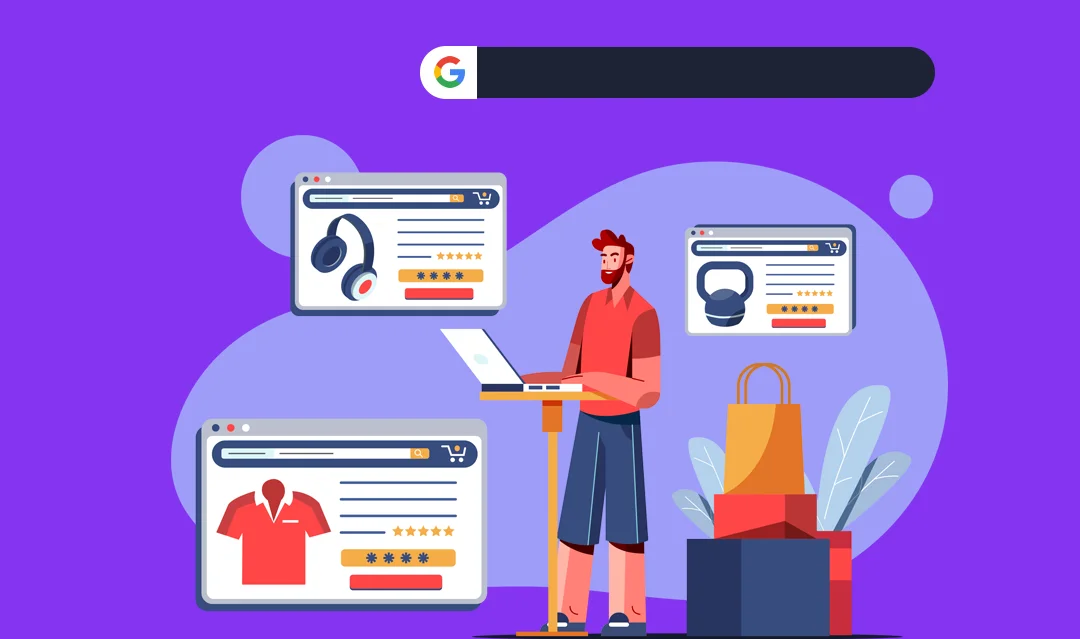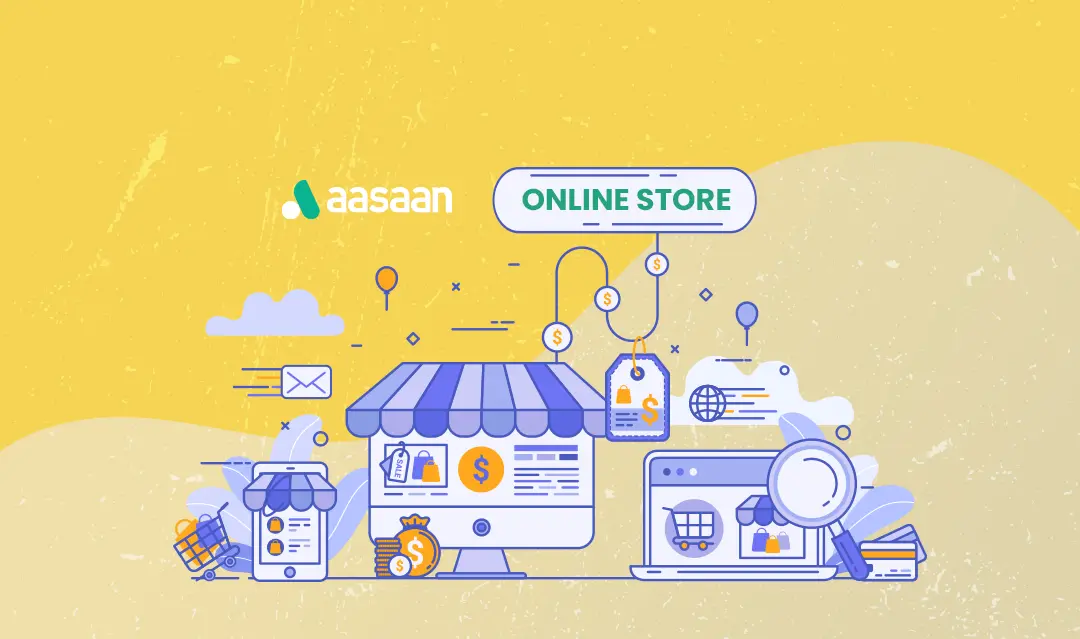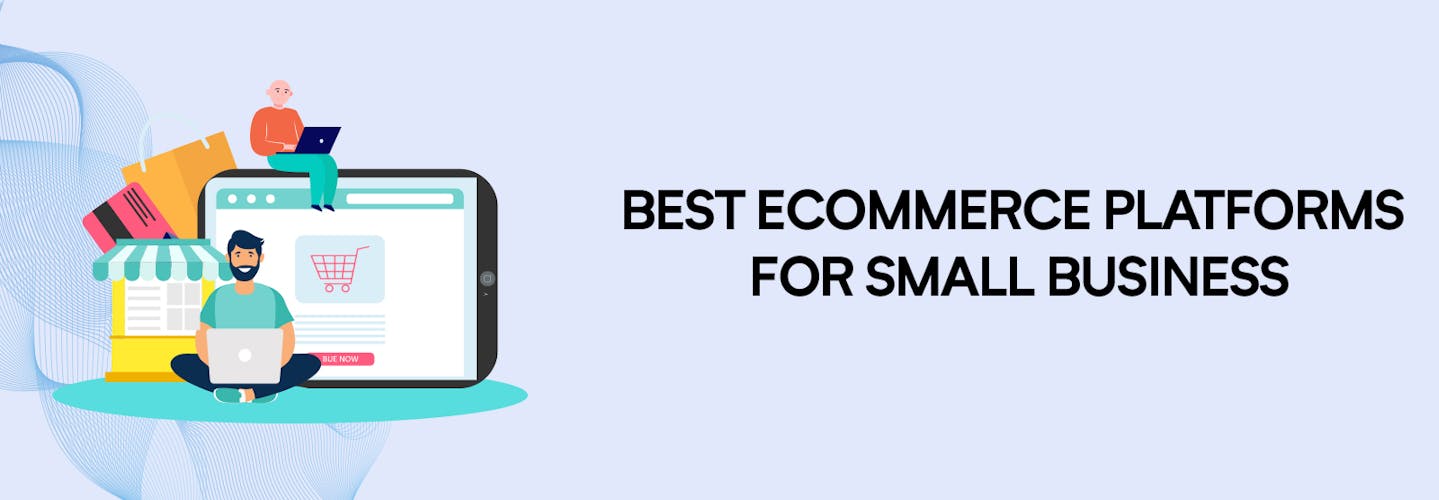
10 Best Ecommerce Platforms for Small Business Owners [2025]
In today’s digital age, the world of commerce has expanded far beyond brick-and-mortar stores and into the realm of the internet.
This phenomenon, known as e-commerce, has revolutionized the way businesses operate, allowing them to reach customers from all corners of the globe with just a few clicks.
For small businesses, in particular, e-commerce presents a unique opportunity to grow and expand.
However, the key to unlocking this potential lies in choosing the right e-commerce platform.
The platform you choose can make or break your online business, influencing everything from the user experience to the efficiency of your operations.
The Evolution of E-commerce Platforms
To fully appreciate the importance of choosing the right e-commerce platform, it’s helpful to understand how these platforms have evolved over the years.
The history of e-commerce platforms is a testament to the rapid pace of technological advancement and the ever-changing needs of businesses and consumers alike.
In the early days of e-commerce, businesses had to build their online stores from scratch—a process that was both time-consuming and costly.
However, the advent of e-commerce platforms changed all that. These platforms provided businesses with ready-made solutions for setting up online stores, drastically reducing the time and resources required to enter the online market.
Over the years, e-commerce platforms have continued to evolve, becoming more sophisticated and feature-rich.
Today’s platforms offer a wide range of functionalities, from inventory management and payment processing to SEO optimization and mobile compatibility.
They cater to businesses of all sizes and types, providing tailored solutions for different needs and budgets.
The Power of E-commerce: A Glimpse into the Future

As we move further into the digital age, the influence of e-commerce continues to grow exponentially. The latest statistics paint a vivid picture of an industry that is not just thriving, but reshaping the global economy.
According to Statista, retail e-commerce sales worldwide were estimated to be $4.28 trillion in 2021, and are projected to reach $6.38 trillion by 2025.
For small businesses, these numbers underscore the immense potential that e-commerce holds. By establishing a strong online presence and choosing the right e-commerce platform, small businesses can tap into this growing market and significantly boost their growth.
However, it’s important to note that the e-commerce landscape is highly competitive. Success in this field requires not just a strong product or service, but also a strategic approach to online selling.
This includes everything from optimizing your website for search engines to providing a seamless user experience.
Best Ecommerce Platforms for Small Business Owners
1. Aasaan:
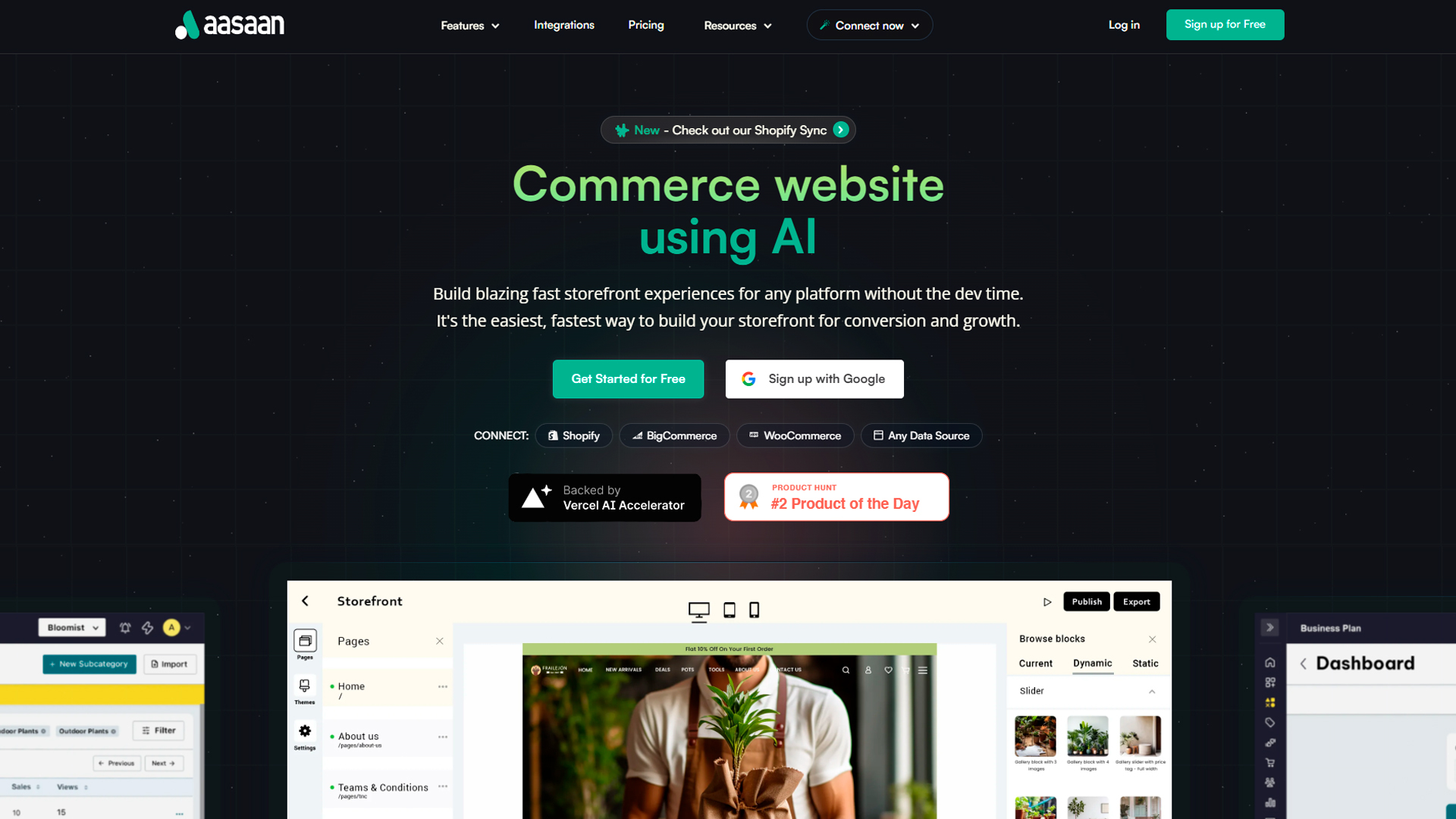
Aasaan is an e-commerce platform designed for small businesses and entrepreneurs looking to build their online store with minimal setup and technical knowledge.
we focuses on providing an easy-to-use interface with a comprehensive set of features. Aasaan’s features include:
- Simplified and user-friendly platform setup.
- Customizable templates and themes to fit various niches.
- Inventory and order management tools.
- Mobile-optimized website designs.
- Multi-currency and multi-language support.
- Secure payment processing with popular gateways, such as PayPal and Stripe.
Aasaan offers three pricing plans:
- Premium: Priced at $50 per month, this plan is for merchants and startups to help grow their business with branding.
- Business: At $165 per month, this plan is for advanced merchants and includes everything in the Premium plan, plus branded iOS and Android apps, full store access via backend API, webhooks, 5 inventory locations, 10 staff accounts, and unlimited integrations.
- Enterprise: This plan is designed for D2C brands looking for unlimited scalability, greater control, and dedicated resources. It includes everything in the Business plan, plus self-hosted storefronts for high performance, custom storefront themes, custom integrations, and 100% uptime SLA. The pricing for this plan is available upon contacting sales
2. Shopify:

Shopify is a popular e-commerce website builder that offers monthly plans designed to accommodate any budget.
It’s considered best for growing businesses due to its scalability and user-friendly interface. Features include:
- Easy setup and 6,000+ app integrations.
- 24/7 customer service.
- Ability to post unlimited products.
- Unlimited storage and bandwidth.
- Analytics to access key online store performance metrics.
The platform has three primary plans:
- Basic Shopify: $29/month - 2 staff accounts, inventory at up to 4 locations.
- Shopify: $79/month - 5 staff accounts, inventory at up to 5 locations.
- Advanced Shopify: $299/month - 15 staff accounts, inventory at up to 8 locations.
All these plans include e-commerce functionality, 24/7 support, Shopify POS Lite, a free SSL certificate, and free shipping label printing. The platform also offers a Shopify Lite plan for $9 per month. There are discounts for annual and biennial payments.
3. BigCommerce:
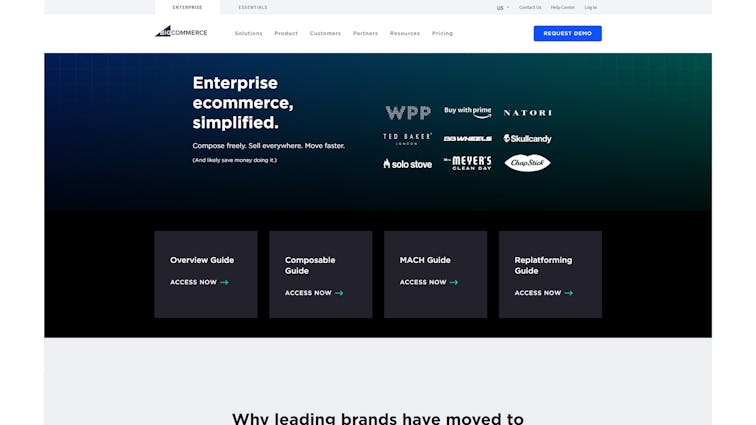
BigCommerce is a software-as-a-service (SaaS) hosted platform ideal for small businesses and new online shop owners. Features include:
- Well-rounded entry-level plan.
- Drag-and-drop website builder.
- Blogging and SEO tools.
- Strong reporting functionality.
- Unlimited goods and services.
- Unlimited accounts for staff.
Like Shopify, BigCommerce offers three plans:
- Standard: $29.95/month (if paid annually) - Best for individuals, annual sales limit of $50,000.
- Plus: $79/month (if paid annually) - Best for small businesses, annual sales limit of $180,000.
- Pro: $299/month (if paid annually) - Best for growing businesses, annual sales limit of $400,000.
- Enterprise Plan: Custom pricing
One key feature missing from the Standard plan is the abandoned cart feature, which is available in the Plus and Pro plans.
BigCommerce doesn’t charge transaction fees but you will need to pay credit card processing fees to your chosen provider. It also supports multiple currencies.
4. WooCommerce:
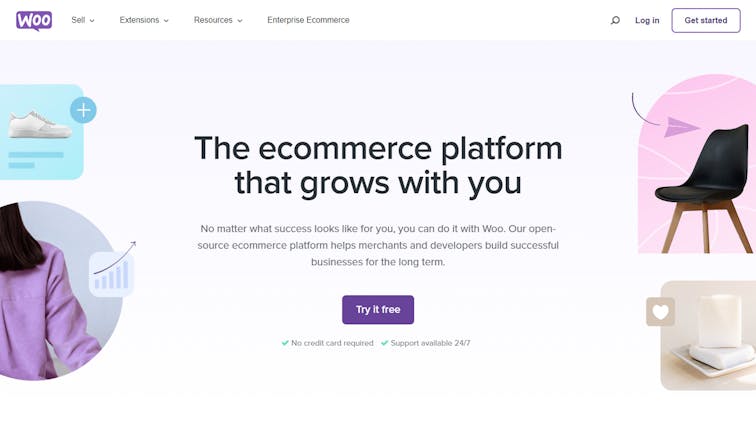
WooCommerce is a widely-used e-commerce plugin for WordPress that allows you to transform your existing website into a fully functional online store.
It’s particularly suitable for businesses already using WordPress or those looking for flexibility. Features include:
- Seamless integration with WordPress sites.
- Large variety of themes and design options.
- Supports both physical and digital products.
- Secure payment options, including PayPal and Stripe.
- Inventory and order management tools.
- Access to numerous plugins and extensions.
Being an open-source platform, WooCommerce is essentially free to use. However, users may incur costs for additional themes, plugins, or extensions, along with costs for hosting and domain registration.
5. Squarespace:
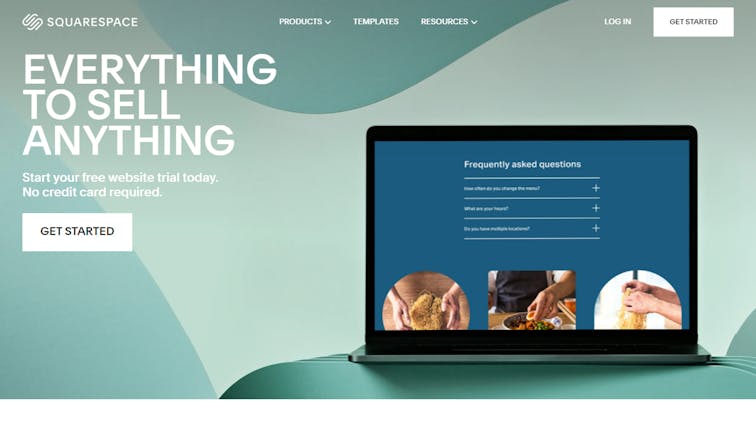
Squarespace is an all-in-one website builder and e-commerce platform known for its visually stunning designs and templates. It’s ideal for small businesses that prioritize aesthetics and branding. Features include:
- Professionally designed templates optimized for e-commerce.
- Easy drag-and-drop website builder.
- Integrated blogging and podcasting tools.
- Inventory and order management system.
- Comprehensive analytics and reporting tools.
- Mobile-optimized design.
Squarespace offers two e-commerce plans:
- Basic Commerce: $26/month (if paid annually) - Unlimited products, gift cards, website metrics.
- Advanced Commerce: $40/month (if paid annually) - Subscription selling, abandoned cart recovery, tailored checkout experience.
Both plans include a free custom domain and SSL certificate, unlimited storage and bandwidth, 24/7 customer support, and no transaction fees. However, payment processing fees still apply for each sale made through the platform.
6. Wix:
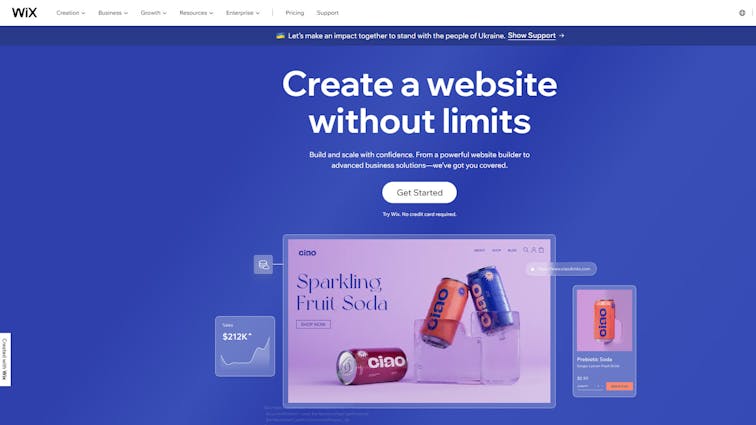
Wix is a versatile website builder and e-commerce platform, known for its user-friendly interface and high level of customization.
It’s a great choice for small businesses on a tight budget or entrepreneurs looking for an easy way to get started. Features include:
- Drag-and -drop editor for easy website customization.
- 500+ customizable templates optimized for e-commerce.
- Mobile optimization for a seamless user experience.
- App market with over 250+ applications for added functionality.
- Inventory management and tracking tools.
- Various payment gateways, including PayPal, Stripe, and Square.
Wix offers three e-commerce plans:
- Business Basic: $23/month (if paid annually) - Secure online payments, custom domain, and up to 20GB storage.
- Business Unlimited: $27/month (if paid annually) - Additional features include 35GB storage, professional e-commerce apps, and logo maker.
- Business VIP: $49/month (if paid annually) - Provides priority customer support, 50 GB storage, and unlimited product collections.
All Wix e-commerce plans include no commission on sales, a custom domain name, a free SSL certificate, and access to various e-commerce features.
Users can also take advantage of the free plan, which offers the basic functionality of the platform, albeit with Wix-branded ads displayed on the website.
Upgrading to a premium plan is recommended for a more professional look and additional features.
7. Ecwid:
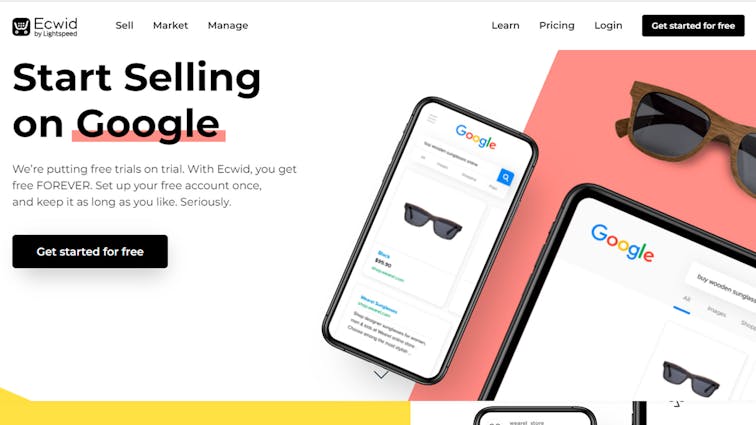
Ecwid is another robust e-commerce platform that works as a plugin, allowing you to add an online store to your existing website or social media profile.
It’s an excellent option for those who want to integrate e-commerce functionality to their current platform without the need to migrate content or change their website. Features include:
- Seamless integration with popular platforms like WordPress, Wix, and Squarespace.
- Mobile-friendly design.
- Multiple payment gateways, including PayPal, Stripe, and Apple Pay.
- Inventory and order management.
- Social media and email marketing tools.
- Support for physical and digital products.
Ecwid offers four pricing plans:
- Free: $0/month - Up to 10 products, mobile responsive, and unlimited bandwidth. Venture: $15/month (if paid annually) - Up to 100 products, access to additional payment gateways, and discount coupons.
- Business: $35/month (if paid annually) - Up to 2500 products, automated tax calculations, eBay integration, and wholesale pricing options.
- Unlimited: $99/month (if paid annually) - Unlimited products, priority support, and custom mobile store app development.
With its flexible integration options and scalability, Ecwid is a popular choice for businesses that already have an online presence but wish to extend their selling capabilities without changing the existing structure. Additional costs may include payment processing fees and costs for third-party plugins or extensions.
8. PrestaShop:
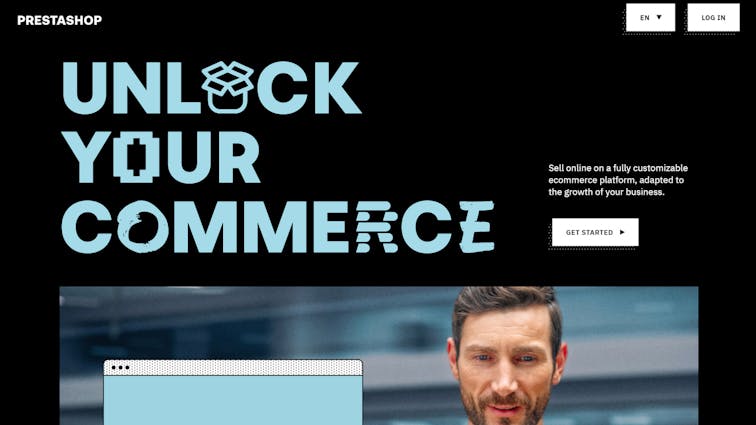
PrestaShop is an open-source e-commerce platform designed for building customizable online stores with a wide range of features.
This platform is more suited to businesses with some technical expertise or those willing to invest in developers. Features include:
- Powerful in-built tools for managing stores, customers, and orders.
- 1000+ professional-looking themes and templates.
- Catalog and inventory management system.
- Support for multiple languages, currencies, and localization options.
- Numerous payment gateways and shipping carriers.
- Integrated marketing and SEO management tools.
Being an open-source software, PrestaShop is free to download and use, but additional costs such as hosting, domain registration, themes, and plugins can raise the overall expenses for running a store.
Users may also need to consider development costs for customization or troubleshooting.
There are a variety of PrestaShop modules available in their marketplace, both free and paid, which can expand your store’s functionality and improve the shopping experience for customers.
9. 3dcart:
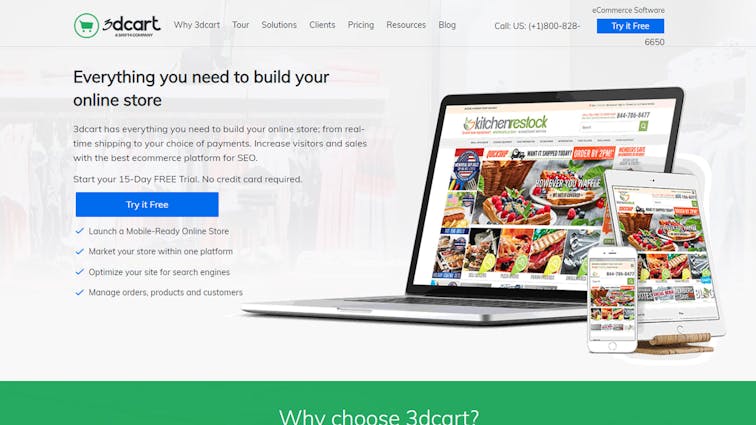
3dcart is a feature-rich e-commerce platform catering to businesses of various sizes, from startups to large enterprises.
With robust SEO tools and other in-built features, it supports online store owners in reaching more customers and boosting sales. Features include:
- Over 200 built-in features designed for e-commerce.
- Easy-to-use store builder with various themes and templates.
- SEO management tools to improve search engine rankings and visibility.
- Inventory and order management system integrated with popular shipping carriers.
- Secure payment processing options, including integration with popular gateways like PayPal and Stripe.
- Inbuilt CRM, email marketing tools, and analytics to manage, grow, and track customer engagement.
- Scalable platform with options for easy integration of custom applications.
3dcart offers five pricing plans:
- Startup Store: $19/month - Up to 100 products, unlimited bandwidth, and newsletter campaign.
- Basic Store: $29/month - No product limit, CRM, and integration with various shipping carriers.
- Plus Store: $79/month - Additional features include email marketing credits, filter by prioritized products, and Google customer ratings
-
- Power Store: $129/month - Optimized features for high-traffic stores, with real-time rates on shipping, FTP access, and integration with popular ERP solutions.
- Pro Store: $229/month - Includes all previous features, with the addition of automation for sales, processes, and reporting. Ideal for large e-commerce enterprises.
Despite catering to various business sizes, 3dcart’s affordability makes it an attractive solution for small businesses looking to establish an online store. It should be noted that additional costs for third-party apps, plugins, and payment processing fees may apply.
10. OpenCart:
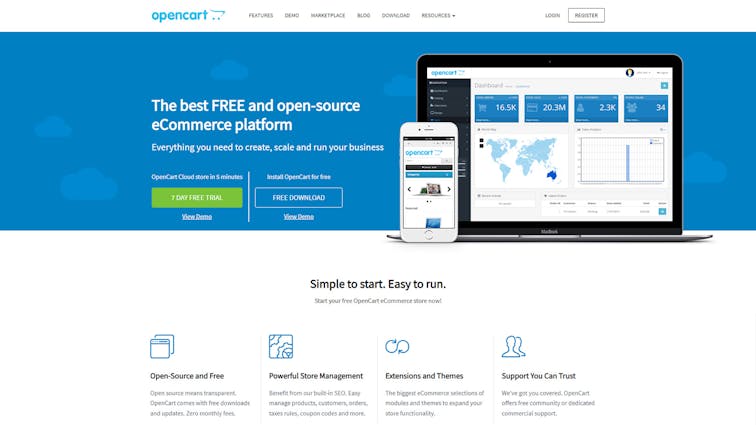
OpenCart is another open-source e-commerce platform that enables businesses to create and customize online stores.
This platform caters to users who possess some technical skills or are willing to invest in developers to maintain and customize their website. Features include:
- User-friendly dashboard designed for smooth store management.
- Extensive range of themes and modules for customization and functionality expansion.
- Support for multiple languages, currencies, and tax rates.
- Seamless integration with numerous payment gateways and shipping methods.
- Built-in SEO and marketing tools to enhance visibility and reach.
- Product and inventory management system, including support for digital products.
- Modular and extensible system for easy integration with other software and services.
As an open-source software, OpenCart is free to download and use. However, you may incur additional costs for hosting, domain registration, premium themes, or modules.
Additionally, development costs for customization and troubleshooting may be required depending on your needs and technical expertise.
OpenCart offers an extensive marketplace with over 13,000 modules and themes to boost your store’s appearance and functionality. Some modules are free, while others require a one-time or subscription-based fee.
Conclusion:
In conclusion, choosing the right e-commerce platform depends on your business size, budget, and technical skills.
Each platform offers unique advantages, catering to different business needs, preferences, and growth expectations.
It’s essential to evaluate your requirements and research each platform’s strengths and weaknesses before deciding which one best fits your business goals.
Regardless of the platform you choose, it’s important to regularly update and optimize your online store, stay informed about the latest trends, and efficiently engage with your customers to ensure a high-quality shopping experience and sustainable growth in today’s competitive e-commerce landscape.
FAQ’s:
1. What is the best e-commerce platform for small businesses?
The best e-commerce platform for a small business depends on the specific needs and goals of the business. Factors to consider include the size of your product catalog, your budget, your technical skills, and the level of customization you require. Some popular e-commerce platforms for small businesses include Aasaan, Shopify, Squarespace, Ecwid, and Square Online.
2. Which is the fastest earning business?
The fastest earning businesses often involve digital products or services due to low overhead costs and scalability. These include software development, digital marketing services, and e-commerce. However, success depends on market demand, business strategy, and execution. It’s crucial to conduct thorough research and planning before starting any business.
3. Which eCommerce platform is best for startups?
Startups often need an e-commerce platform that is cost-effective, easy to use, and scalable. Aasaan is a popular choice due to its ease of use and scalability. Squarespace is another good option, particularly for startups that want to create a visually stunning online store. Ecwid is a great choice for startups that already have a website and want to add e-commerce functionality.
4. How to start a small business online?
Starting a small business online involves several steps:
- Identify a business idea or product you want to sell.
- Conduct market research to validate your idea.
- Create a business plan.
- Register your business and get any necessary licenses or permits.
- Create your online store using an e-commerce platform.
- Add your products and set up payment and shipping options.
- Market your online store to attract customers.
5. How to sell a product online?
Selling a product online involves the following steps:
- Choose what products to sell.
- Identify your target audience.
- Choose the right e-commerce platform for your needs.
- Set up your online store, including product descriptions, images, and pricing.
- Set up payment and shipping options.
- Implement a marketing strategy to attract and retain customers.
- Monitor your sales and adjust your strategy as needed.



